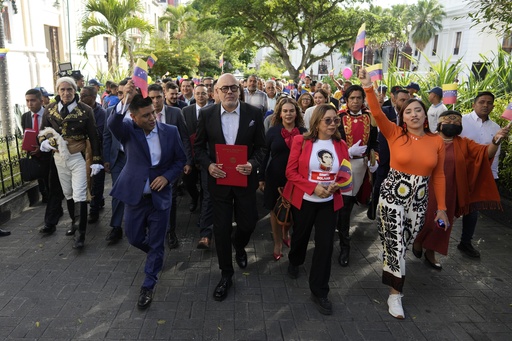
CARACAS, Venezuela — On Thursday, Venezuelan lawmakers passed a significant piece of legislation that categorizes economic sanctions—such as those implemented by the United States—as crimes against humanity. This new law also facilitates the prosecution of individuals who show support for these sanctions.
The legislation, which was approved by the National Assembly, targets prominent opposition figures who have backed economic sanctions in hopes of pressuring the Venezuelan government to enter into negotiations. As part of this measure, individuals who advocate for economic sanctions will be prohibited from running for political office, face potential prosecution even if absent, and could see their assets confiscated.
According to the text of the law, “The unilateral coercive measures and other restrictive or punitive measures imposed against the Bolivarian Republic of Venezuela constitute a crime against humanity, within a systematic and widespread attack against the civilian population.”
Those convicted under this law could face imprisonment for a minimum of 25 years. The passing of this bill coincides with recent U.S. actions, including the imposition of sanctions against 21 individuals accused of undermining Venezuela’s presidential election held in July. This legislative move also follows a decision by the U.S. House of Representatives to stop the federal government from engaging with any businesses linked to President Nicolás Maduro’s administration.
This legislative action represents the ruling party’s continued efforts to suppress dissent in the aftermath of the July election, which both Maduro and former diplomat Edmundo González claim to have won. After the polls closed on July 28, Venezuela’s National Electoral Council, heavily influenced by Maduro’s supporters, swiftly declared him the victor. However, unlike prior elections, there was no detailed vote count provided by electoral authorities.
Conversely, the main opposition coalition obtained tally sheets from 80% of the electronic voting machines across the nation, displayed the data online, and asserted that their findings indicated González had triumphed with double the votes received by Maduro.
In response to the elections, widespread anti-government protests erupted, leading to a heavy crackdown by state security forces. Over 2,200 individuals were arrested during these protests, including political activists, lawyers, election workers, and demonstrators of all ages.
Following an arrest warrant linked to the publication of the disputed vote counting documents, González fled to Spain in September. Meanwhile, opposition leader Maria Corina Machado has remained in hiding for months. Machado emerged victorious in the presidential primary organized by the opposition coalition last year. Nevertheless, her exclusion from the July 28 ballot was facilitated by an administrative decision declaring she couldn’t run due to her past advocacy for broad U.S. economic sanctions aimed at toppling Maduro’s regime—a move that has had a detrimental impact on Venezuela’s crucial oil industry.
Machado’s chosen replacement for the Unitary Platform opposition coalition was similarly barred from the ballot, prompting the coalition’s leaders to endorse González as their candidate.
Recently, the Attorney General’s Office in Venezuela announced the initiation of a new inquiry into Machado, asserting that her endorsement of the U.S. House bill constitutes acts of treason and conspiracy with foreign nations, among other charges.
